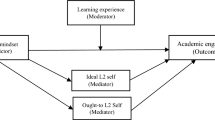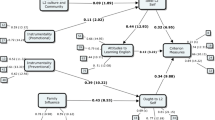Abstract
Taking the L2 Motivational Self System (L2MSS) model as its theoretical basis, this study aimed to extend knowledge of the learning motivation of Korean language learners. A survey questionnaire was administered to 967 Korean language learners at 28 universities in China to investigate their motivation for learning the Korean language and the relationship between their learning motivation and their learning engagement. The results showed high levels of the ideal L2 self and the L2 learning experience and low levels of the ought-to L2 self. Additionally, the L2MSS had a high explanatory power for engagement. The ideal L2 self and the L2 learning experience were positively associated with the learning engagement of the participating Korean language learners. These results enhance understanding of Korean language learners’ learning motivation and may offer guidance for improving their learning engagement.

Similar content being viewed by others
Data availability
Data are available on request.
References
Al-Hoorie, A. H. (2018). The L2 motivational self system: a meta-analysis. Studies in Second Language Learning and Teaching., 8(4), 721–754.
Boo, Z., Dörnyei, Z., & Ryan, S. (2015). L2 motivation research 2005–2014: understanding a publication surge and a changing landscape. System, 55, 145–157. https://doi.org/10.1016/j.system.2015.10.006
Browne, M. W., & Cudeck, R. (1993). Alternative ways of assessing model fit. In K. A. Bollen & J. S. Long (Eds.), Testing structural equation models (pp. 136–162). Sage.
Chen, Y. L. E., & Kraklow, D. (2015). Taiwanese college students’ motivation and engagement for English learning in the context of internationalization at home: a comparison of students in EMI and Non-EMI programs. Journal of Studies in International Education, 19(1), 46–64. https://doi.org/10.1177/1028315314533607
Chen, Y., Zhao, D., & Shen, Q. (2021). Chinese students’ motivation for learning German and French in an intensive non-degree programme. Circulo De Linguistica Aplicada a La Comunicacion, 86, 81–92. https://doi.org/10.5209/clac.75497
Csizér, K., & Kormos, J. (2014). The ideal L2 self, self- regulatory strategies and autonomous learning: a comparison of different groups of English language learners. In K. Csizér & M. Magid (Eds.), The impact of self-concept on language learning (pp. 73–86). Multilingual Matters.
Csizér, K., & Lukács, G. (2010). The comparative analysis of motivation, attitudes and selves: the case of English and German in Hungary. System, 38, 1–13. https://doi.org/10.1016/j.system.2009.12.001
de Burgh-Hirabe, R. (2019). Motivation to learn Japanese as a foreign language in an English speaking country: an exploratory case study in New Zealand. System, 80, 95–106. https://doi.org/10.1016/j.system.2018.11.001
Dörnyei, Z. (2001). Motivational strategies in the language classroom. Cambridge University Press.
Dörnyei, Z. (2019). Towards a better understanding of the L2 Learning Experience, the Cinderella of the L2 Motivational Self System. Studies in Second Language Learning and Teaching, 9(1), 19–30. https://doi.org/10.14746/ssllt.2019.9.1.2
Dörnyei, Z., & Al-Hoorie, A. H. (2017). The motivational foundation of learning languages other than global English: theoretical issues and research directions. The Modern Language Journal, 101(3), 455–468. https://doi.org/10.1111/modl.12408
Dörnyei, Z., & Kubanyiova, M. (2014). Motivating learners, motivating teachers: Building vision in the classroom. Cambridge, UK: Cambridge University Press.
Dörnyei, Z. (2005). The psychology of the language learner: Individual differences in second language acquisition. Lawrence Erlbaum.
Eberhard, D. M., Simons, G. F., & Fennig, C. D. (Eds.). (2021). Ethnologue: Languages of the world. TX USA: SIL International.
Feng, L., & Papi, M. (2020). Persistence in language learning: the role of grit and future self-guides. Learning and Individual Differences., 8, 101904. https://doi.org/10.1016/j.lindif.2020.101904
Fraschini, N., & Caruso, M. (2019). “I can see myself ” A Q methodology study on self vision of Korean language learners. System, 87, 102–147. https://doi.org/10.1016/j.system.2019.102147
Fredricks, J. A., Blumenfeld, P., Friedel, J., & Paris, A. (2005). School Engagement. In K. A. Moore & L. H. Lippman (Eds.), What do children need to flourish?: Conceptualizing and measuring indicators of positive development (pp. 305–321). Springer.
Gignac, G. E., & Szodorai, E. T. (2016). Effect size guidelines for individual differences researchers. Personality and Individual Differences, 102, 74–78. https://doi.org/10.1016/j.paid.2016.06.069
Han, Y. J. (2021). Motivations for learning Korean in Vietnam: L2 selves and regulatory focus perspectives. Journal of Language, Identity & Education. https://doi.org/10.1080/15348458.2021.1935961
Huang, S. C. (2019). Learning experience reigns—Taiwanese learners’ motivation in learning eight additional languages as compared to English. Journal of Multilingual and Multicultural Development, 40(7), 576–589. https://doi.org/10.1080/01434632.2019.1571069
Huang, H. T., Hsu, C. C., & Chen, S. W. (2015). Identification with social role obligations, possible selves, and L2 motivation in foreign language learning. System, 51, 28–38. https://doi.org/10.1016/j.system.2015.03.003
Jee, M. J. (2015). A study of language learner motivation: learners of Korean as a foreign language. Journal of Korean Language Education., 26(2), 213–238.
Kong, J. H., Han, J. E., Kim, S., Park, H., Kim, Y. S., & Park, H. (2018). L2 motivational self system, international posture and competitiveness of Korean CTL and LCTL college learners: a structural equation modeling approach. System, 72, 178–189. https://doi.org/10.1016/j.system.2017.11.005
Lee, I. H. (2018). Effects of contact with Korean popular culture on KFL learners’ motivation. The Korean Language in America, 22(1), 25–45. https://doi.org/10.5325/korelangamer.22.1.0025
Lee, I. H. (2019). Non-heritage Korean learners’ motivation to continue learning Korean in the US. Bilingual Research., 74, 385–415.
Lee, J. S., & Lee, K. (2021). The role of informal digital learning of English and L2 motivational self system in foreign language enjoyment. British Journal of Educational Technology, 52(1), 358–373. https://doi.org/10.1111/bjet.12955
Mendoza, A., & Phung, H. (2019). Motivation to learn languages other than English: a critical research synthesis. Foreign Language Annals, 52(1), 121–140. https://doi.org/10.1111/flan.12380
Newmann, F. M. (1992). Student engagement and achievement in American secondary schools. New York, NY: Teacher College Press.
Oga-Baldwin, W. L. Q., & Nakata, Y. (2017). Engagement, gender, and motivation: a predictive model for Japanese young language learners. System, 65, 151–163. https://doi.org/10.1016/j.system.2017.01.011
Papi, M., & Khajavy, G. H. (2021). Motivational mechanisms underlying second language achievement: a regulatory focus perspective. Language Learning, 71(2), 537–572. https://doi.org/10.1111/lang.12443
Reeve, J. (2012). A self-determination theory perspective on student engagement. In S. L. Christenson, A. L. Reschly, & C. Wylie (Eds.), Handbook of research on student engagement (pp. 149–172). Springer.
Roeser, R. W., Eccles, J. S., & Sameroff, A. J. (1998). Academic and emotional functioning in early adolescence: longitudinal relations, patterns, and prediction by experience in middle school. Development and Psychopathology, 10, 321–352. https://doi.org/10.1017/S0954579498001631
Schreiber, J. B., Stage, F. K., King, J., Nora, A., & Barlow, E. A. (2006). Reporting structural equation modeling and confirmatory factor analysis results: a review. The Journal of Educational Research, 99(6), 323–338. https://doi.org/10.3200/JOER.99.6.323-338
Skinner, E. A., Kindermann, T. A., & Furrer, C. J. (2009). A motivational perspective on engagement and disaffection conceptualization and assessment of children’s behavioral and emotional participation in academic activities in the classroom. Educational and Psychological Measurement, 69(3), 493–525. https://doi.org/10.1177/0013164408323233
Sulis, G., & Philp, J. (2021). Exploring connections between classroom environment and engagement in the foreign language classroom. In P. Hiver, A. H. Al-Hoorie, & S. Mercer (Eds.), Student engagement in the language classroom (pp. 241–259). Multilingual Matters.
Taguchi, T., Magid, M., & Papi, M. (2009). The L2 motivational self system among Japanese, Chinese and Iranian learners of English: A comparative study. In Z. Dörnyei & E. Ushioda (Eds.), Motivation, language identity and the L2 self (pp. 66–97). Multilingual Matters.
Thompson, A. S. (2017). Language learning motivation in the United States: an examination of language choice and multilingualism. The Modern Language Journal, 101(3), 483–500. https://doi.org/10.1111/modl.12409
Tu, B. (2018). The developmental change of Korea policies for foreign national Koreans and its influence on Korean ethnic group’s employment in Korea. Minjok Yeonku, 72, 50–65.
Wang, X. F. (2022). A study on the Korean self and learning motivation of Chinese learners: focusing on vision and visual style. Journal of the International Network for Korean Language and Culture., 19(2), 131–172.
You, C., & Dörnyei, Z. (2016). Language learning motivation in China: results of a large-scale stratified survey. Applied Linguistics, 37(4), 495–519. https://doi.org/10.1093/applin/amu046
Zhang, Y. N., & Kim, Y. J. (2014). A study on the correlations among L2 learning motivation, anxiety and L2 selves of learners of Korean. Teaching Korean as a Foreign Language, 40, 309–336.
Zhang, X., Dai, S., & Ardasheva, Y. (2020). Contributions of (de)motivation, engagement, and anxiety to English listening and speaking. Learning and Individual Differences, 79, 1–13. https://doi.org/10.1016/j.lindif.2020.101856
Funding
This work was supported by Shandong University Grant for Undergraduate Teaching and Learning Reform under Grant Number 2022Y044 and 2022Y055.
Author information
Authors and Affiliations
Contributions
All authors contributed to the study conception and design. Xian Li completed the first draft of the manuscript, and Jiying Han reviewed and finalized the final manuscript. Both authors read and approved the final manuscript.
Corresponding author
Ethics declarations
Conflict of interest
The authors declare no conflict of interest.
Additional information
Publisher's Note
Springer Nature remains neutral with regard to jurisdictional claims in published maps and institutional affiliations.
Appendices
Appendix
Motivation Scale
Ideal L2 Self (5 items)
-
1.
I can imagine myself living abroad and having a discussion in Korean.
-
2.
Whenever I think of my future career, I imagine myself using Korean.
-
3.
I can imagine myself speaking Korean with international friends or colleagues.
-
4.
I can imagine myself speaking Korean as if I were a native speaker of Korean.
-
5.
I imagine myself as someone who is able to speak Korean.
Ought-to L2 Self (7 items)
-
1.
I study Korean because close friends of mine think it is important.
-
2.
Learning Korean is necessary because people surrounding me expect me to do so.
-
3.
I consider learning Korean important because the people I respect think that I should do it.
-
4.
Studying Korean is important to me in order to gain the approval of my peers/teachers/family/boss.
-
5.
Studying Korean is important to me because an educated person is supposed to be able to speak Korean.
-
6.
Studying Korean is important to me because other people will respect me more if I have a knowledge of Korean.
-
7.
It will have a negative impact on my life if I don’t learn Korean.
Learning Experience (4 items)
-
1.
I like the atmosphere of my Korean classes.
-
2.
I always look forward to Korean classes.
-
3.
I find learning Korean really interesting.
-
4.
I really enjoy learning Korean.
Engagement Scale
Behavioural Engagement (5 items)
-
1.
I try hard to do well in Korean classes.
-
2.
In Korean classes, I work as hard as I can.
-
3.
When I’m in Korean classes, I participate in class discussions.
-
4.
I pay attention in Korean classes.
-
5.
When I’m in Korean classes, I listen very carefully.
Emotional Engagement (5 items)
-
1.
When I’m in Korean classes, I feel good.
-
2.
When we work on something in Korean classes, I feel interested.
-
3.
Korean classes are fun.
-
4.
I enjoy learning new things in Korean classes.
-
5.
When we work on something in Korean classes, I get involved.
Cognitive Engagement (6 items)
-
1.
I check my Korean homework for mistakes.
-
2.
I study Korean in the dormitory or library even when I don’ t have a test.
-
3.
When I read a Korean article, I ask myself questions to make sure I understand what it is about.
-
4.
I read extra books to learn more about things we do in Korean classes.
-
5.
If I don’t know what a Korean word means when I am reading, I do something to figure it out.
-
6.
If I don’t understand what I read, I go back and read the Korean material over again.
Rights and permissions
Springer Nature or its licensor (e.g. a society or other partner) holds exclusive rights to this article under a publishing agreement with the author(s) or other rightsholder(s); author self-archiving of the accepted manuscript version of this article is solely governed by the terms of such publishing agreement and applicable law.
About this article
Cite this article
Li, X., Han, J. What Motivates Korean Language Learners to Learn? Motivational Characteristics and their Relationships with Learning Engagement. Asia-Pacific Edu Res 33, 273–282 (2024). https://doi.org/10.1007/s40299-023-00726-0
Accepted:
Published:
Issue Date:
DOI: https://doi.org/10.1007/s40299-023-00726-0




